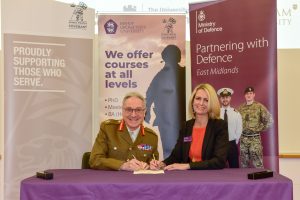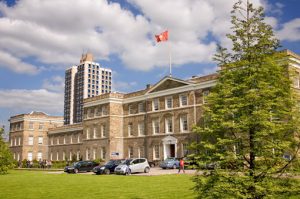News
September 28th 2020
East Midlands education sector gives a lesson in supporting the Armed Forces community
With 6 local education sector institutions recently receiving a Silver Employer Recognition Scheme (ERS) Award, and one achieving the prestigious Gold Award, the East Midlands is demonstrating how Education and Defence can achieve powerful results through working together.
In April 2019, the then Universities Minister and Defence Minister called for all UK Universities to step up and support ex-service personnel and their families. The participation rate for young people from military service families in the higher education sector is just 24%, compared to the rate for the whole population of around 43%.
East Midlands Universities have led by example, with Bishop Grosseteste and Nottingham Trent University both earning Silver Awards in 2020, and the University of Leicester achieving the highest accolade, the Gold Award. But throughout the education sector, colleges and schools are also seeing the benefits of supporting the Armed Forces, in terms of recruitment, involvement with the community and the level of training and skills ex-military people and their families bring.

Lt General Richard Nugee with Katy Nevitt of Bishop Grosseteste University
Bishop Grosseteste University, in Lincoln, is in the heart of RAF country and therefore has a high awareness of the challenges of a Military career and its effects on the family. Frequent moves, absence on deployment of serving personnel and managing home life can mean Military spouses have little career stability. But it also means they have exceptional organisational skills, are flexible, and used to adapting to new situations quickly. Bishop Grosseteste has recognised this by offering an uncapped leave scheme and flexible working, which have aided staff retention.
Nottingham Trent University ensures its wider recruitment team are aware of the relevance of military skills to the civilian work environment. Moreover, they have committed to changing and adapting recruitment and work environments to lower barriers for those who are considered disabled, which includes wounded, injured and sick service leavers. The work of its Medical Technologies Innovation Facility is helping to develop rehabilitative technologies and cell-based therapies, which will be of particular relevance to the wounded and injured veterans of the Armed Forces.
Enabling wider participation in higher education
Max Bardwell, Senior Business Development Manager at Nottingham Trent University‘s Medical Technologies Innovation Facility, and former Reservist, said: “The Armed Forces Covenant is fundamentally about enabling wider participation in higher education and higher education employment; by lowering barriers for those who might otherwise find it prohibitively difficult to engage. This speaks to the core of NTU’s mission and is therefore why we are pleased with being able to sign up to the Covenant.”

University of Leicester campus
The University of Leicester achieved their Gold Award this year through acting as an exemplar for the HE sector, advocating for the Armed Forces Covenant and encouraging other Universities to sign up. They have shared their Gold Action plan with a number of Universities who are also looking to achieve Gold status. Their plan includes forming strong relationships with local Reserve units, presenting on the benefits of studying and what is available, and opening up recruitment opportunities. It also runs an Armed Forces Student Society, allowing Reserve units to attend fresher’s recruiting events for free and is a permanent member of the East Midlands Universities Combined Military Education Committee.
Casterton College, Rutland, recognised the particular difficulties faced by students from Armed Forces families transitioning to new schools and appointed a Forces Families Liaison Officer to support them. It also funds transport for students based at RAF Wittering and works with Rutland County Council to promote the voice of service children in the county.
The Air and Defence College run by Lincoln College offers a unique, employer-led, career-focused education and technical training course for 16-19 year olds. It also ensures students benefit from the leadership and expertise of the Armed Forces by supporting service leavers to retrain as FE Teachers and make the transition to the classroom where they can share their expertise with the next generation.
Primary schools play a key role in supporting forces’ children
But it’s not just higher education that sees the benefit in working with the Armed Forces community, even primary schools have created new programmes. William Alvey School in Lincolnshire has over 50 children in its ‘Bluey Club’, a service set up to address the emotional and social well-being of forces children. Offering a safe environment in which to discuss feelings and experiences, their work is done through group activities, discussions and one to one support. And Manor Leas Junior Academy ensures that job applicants with previous service experience are highlighted at short-listing stage, and where they do not meet the criteria, thought is given to the skill set they could bring to the role rather than focusing solely on the qualifications or experience needed.
These leading educational establishments have demonstrated, through a myriad of practical policies, creative thinking and championing inclusivity, the benefits to be gained from engaging with Defence personnel. Whether veterans, Reservists, Cadet Force Adult Volunteers or the families of serving Armed Forces personnel, there is a wealth of talent and experience to be harnessed. And that talent needs the support of the Education sector to enable it to flourish and thrive.
Find out more about the Armed Forces Covenant.
"The Armed Forces Covenant is fundamentally about enabling wider participation in higher education by lowering barriers for those who might otherwise find it prohibitively difficult to engage." Max Bardwell, Senior Business Development Manager, Nottingham Trent University's Medical Technologies Innovation Facility




